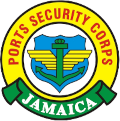The establishment of the Ports Security Corps Ltd.(PSCL) was the Government’s response to a major drug find on an Air Jamaica aircraft in 1989. This posed a serious threat to Air Jamaica’s continued operations as well as the country’s international trade.
Established on April 5, 1989, the mandate of the PSCL was primarily to secure the ports of entry/exit, to prevent the trafficking of illicit drugs and other contraband, and to restrict the passage of unauthorized persons to the restricted areas of the port.
In 2016, Cabinet approved plans for the Ports Security Corps Ltd. to restructure and modernize its operations. This was done under the strategic leadership of the new board of directors led by Chairman Ferris Ziadie. PSCL was, therefore, changed from a limited liability company into a statutory body with a focus on national security. New legislation empowered and gave recognition to the Corps as an essential service. Its security personnel now have the powers of arrest, detention and search and are accorded a similar level of respect as law enforcement agencies. This was a first for the Corps and uplifted the spirit of the officers who were previously demoralized.
This corporate or organisational imperative was designed to build capacity and improve financial management. The change is a national strategic priority and a security imperative to strengthen border protection mechanisms and improve the overall security stance and architecture of the country.
Under its new mandate, the PSC became the designated security provider to operate and/or provide security services with identified security zones in selected ports of entry in accordance with the International Ship and Port Facility Security Code of the International Maritime Organization and Annex 17 (Security) of the Chicago Convention of the International Civil Aviation Organization.a
Strategic Objectives and Guiding Principles
Jamaica’s aviation and maritime security facilities comprise the three international airports, two domestic aerodromes, and several Government-owned seaport facilities and free zones. Under the existing arrangement, the PSCL has the mandate to conduct passenger, employee, baggage and cargo security screening and access control for specially selected ports of entry.
Jamaica’s international air and seaports facilitates three to four million passengers and in excess of eight million individual pieces of luggage and unaccompanied baggage annually.
Every one of these requires security screening. These figures are likely to increase, given the expansion plans for Kingston Harbour and the Logistics Hub, which promise new cruise ships and increased air passengers and cargo. This is a highly regulated function with exacting international standards that requires specifically trained security screeners, all of whom require annual recertification.
Responsibility
Jamaica’s Port Security Corps has security responsibility for Jamaica’s three international airports, Tinson Pen and Negril aerodromes; the Montego Bay Cruise Ship Pier, the Falmouth Cruise Ship Pier, the Kingston Freeport Terminal, the Kingston and Montego Bay Free Zones, and the Half-Way Tree Transport Centre and Bus Depots.
The Port Security officers effectively and efficiently screen persons who access aircraft or restricted areas, the property in their possession or control, and the belongings or baggage that they give to an air carrier for transport.
This is done under the guidance/oversight of the industry regulators, the Jamaica Civil Aviation Authority.
A structured cooperative mechanism (or memorandum of understanding) was developed for shared oversight and governance between the ministries with responsibility for national security and transport and mining.
This is in light of the direct and indirect impact of the PSCL’s operations on national security.
Achievements
Significantly, in the past year, a number of achievements were realised under the Port Security Corps Ltd.
These included, but were not limited to, drug detection (1057 kg of ganja and 78.41 kg of cocaine).
Security services were also provided for over 3,198 vessels (cruise and cargo ships).
Approximately four firearms, 15 magazines, and 1,202 assorted rounds of ammunition were prevented from entering the criminal network.
The Port Security Corps Limited remains committed to maintaining safe and secure ports and strengthening border protection.


0 comments
Write a comment